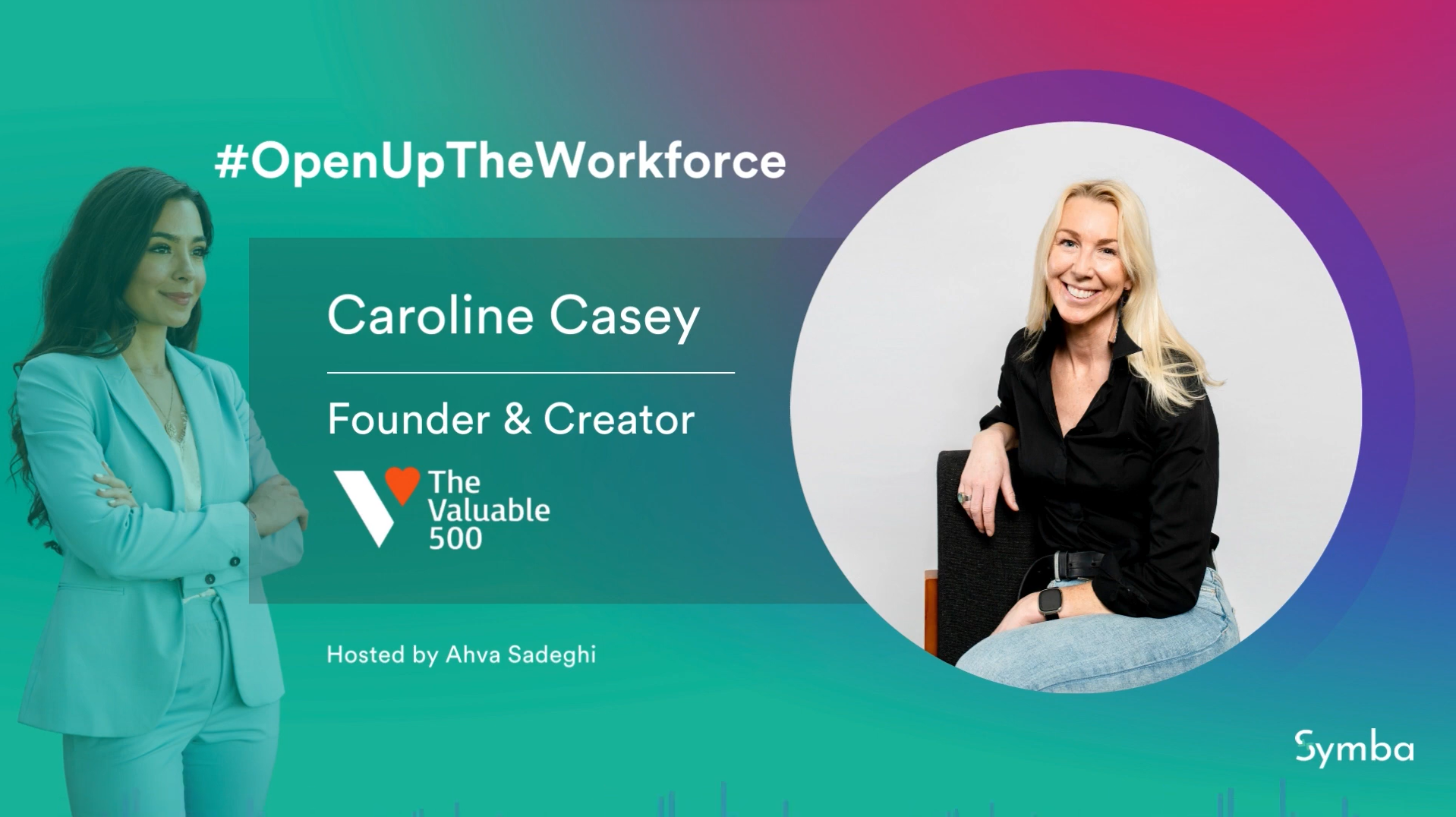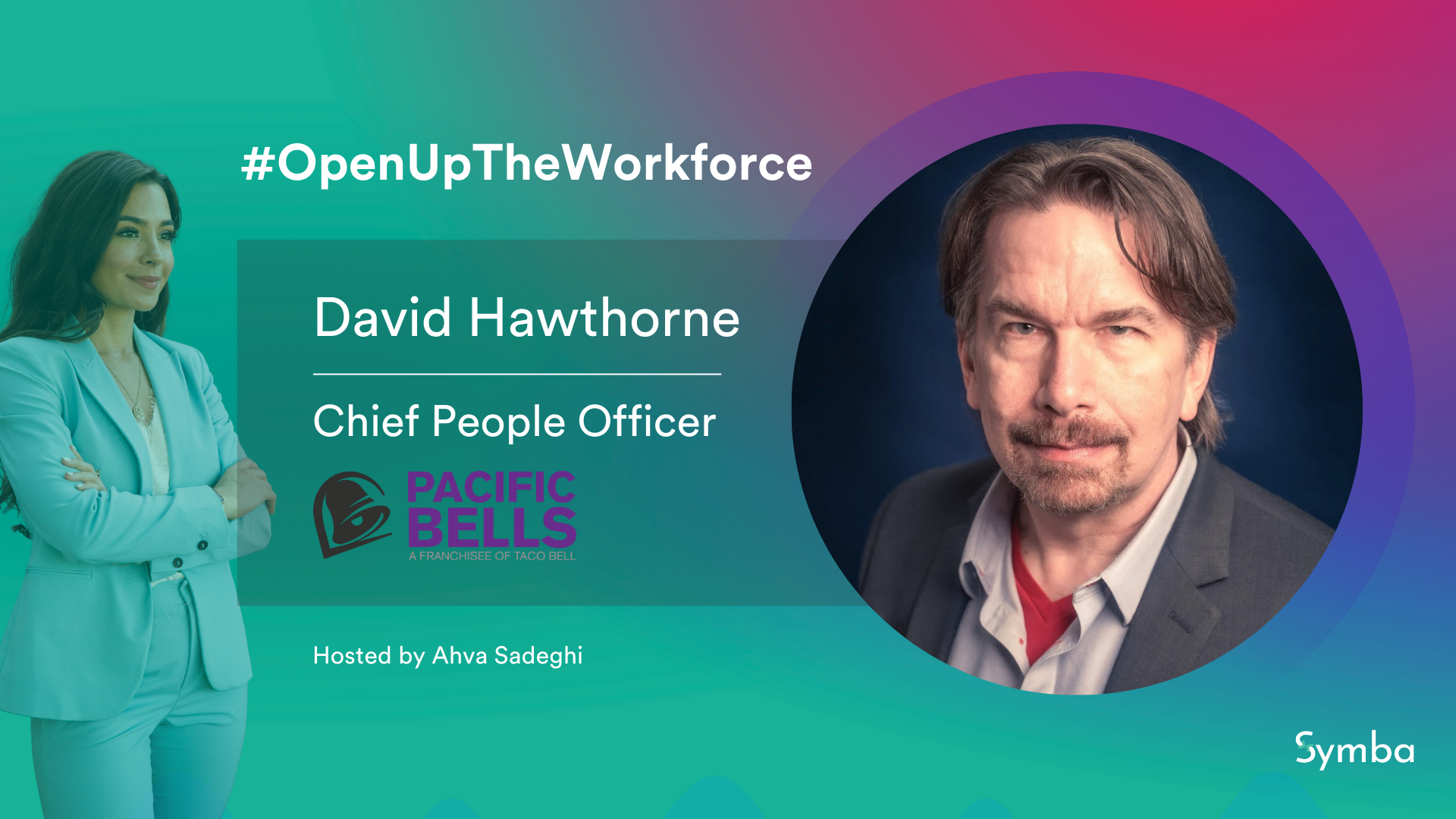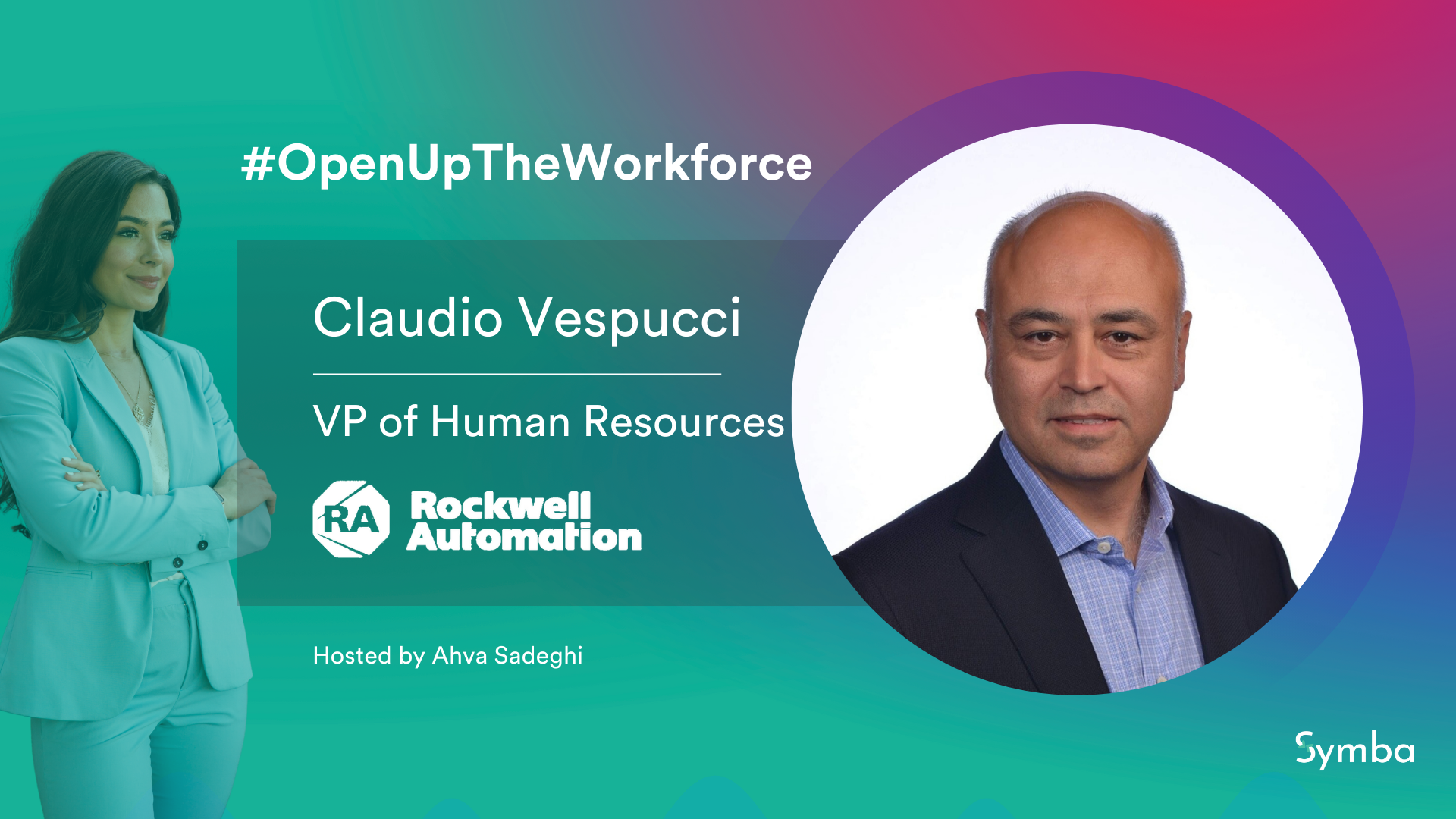Presented by Symba, #OpenUpTheWorkforce interviews feature executives advancing inclusion, diversity, and equity for the future of work. In these short audio-only episodes, host Ahva Sadeghi speaks with top leaders about what it takes to develop and implement inclusive processes.
In this episode of #OpenUpTheWorkforce, Ahva speaks to Caroline Casey, founder of The Valuable 500, the world’s largest CEO collective and business movement for disability inclusion. Caroline shares her reasons for launching the company and how she has signed up 500 companies on her quest to give people living with disabilities a seat at the table. Find out how partner companies intend to achieve disability inclusion through synchronized global action. Listen to the whole episode here.
The Motivation Behind Starting The Valuable 500
“I believe the only way to end disability exclusion is to be working with one of the most powerful forces on the planet. And that is business.” - Caroline Casey
Caroline identifies herself as a positive disruptor, an inclusion hustler, and an ardent problem solver—traits that motivated her to found The Valuable 500. She created the company for two main reasons; as someone with lived experience with disability, Caroline looks to a world where people don’t have to hide who they are. She shares her personal example of coming out of the disability closet when she was 28. Professionally, Caroline was frustrated with the slow progress in addressing disability exclusion, which affects a significant portion of the population. To end disability exclusion, Caroline believes businesses can play a crucial role.
The Disability Landscape Today
Here’s more of what you need to know about the disability landscape today:
- 80% of disabilities are acquired between the ages of 18 and 64.
- 80% of disabilities are invisible and often overlooked.
- 20% of the world’s population has experienced disability.
- When considering those who care about or love a person with a disability, the impact extends to 54%.
Caroline believes the biggest barrier in business is people’s perceptions and understanding of disability. For universality, The Valuable 500 adopts the United Nations’s definition of disability as “those who have long-term physical, mental, intellectual, or sensory impairments that, in interaction with various barriers, may hinder their full and effective participation in society on an equal basis with others.” Caroline encourages everyone to be curious about disabilities and not define people solely by their disabilities.
What Disability Inclusion Entails
Disability inclusion is more than just workplace inclusion. It spans how products are designed with the disabled in mind to ensure this population derives the full value of products or services like everyone else. As things stand, the world is not designed inclusively, and that is because lived experience has not been part of the design process. Caroline opines that the basic principle of universal design is one that ensures physical and digital spaces are accessible to everyone. This will require business leaders to be more intentional with their inclusivity efforts, such as ensuring people with disabilities are part of the design process from the start. Inclusion, by definition, is for everyone. Businesses can’t afford to choose what inclusion they want to pursue or which one to leave out.
“Technology, if designed inclusively, could be the greatest equalizer of all time.”
Caroline believes technology can impact disability inclusion because it is a powerful force for change, especially in The Valuable 500’s mission. However, for technology to positively impact inclusion, the disability community has to be part of the design process.
The Valuable 500 Synchronized Collective Action for Disability Inclusion Initiative
The Valuable 500's strategy to combat disability exclusion is through coordinated collective action—harnessing the strength of 500 partners united in a synchronized effort, all progressing in tandem, targeting common systemic barriers. These obstacles include challenges in leadership, reporting, and representation, with the overarching goal of fostering a more inclusive environment for individuals with disabilities.
Synchronized collective action aims at promoting disability inclusion in leadership roles, including in the C-suite, and ensuring authentic representation of people with disabilities in corporate communications. On reporting, the companies in the partnership commit to include disability performance in their annual reports.
Caroline gives an example of what companies are required to include in these reports, outlining key components such as:
- Inclusion of Employee Resource Groups (ERGs) specifically tailored for individuals with disabilities.
- Evaluation of whether ERGs benefit from executive sponsorship.
- Specification of the goals and budgets associated with ERGs.
- Assessment of ERG training programs and the company's commitment to digital accessibility.
- Quantification of the number of individuals with disabilities within the broader company workforce.
The endgame here is to drive systemic change rather than addressing surface-level issues.
Secret Sauce for Getting and Sustaining Buy-in for Disability Inclusion
The Valuable 500’s success in getting 500 CEOs to commit was achieved by casting the net wide and combining the power of authentic storytelling with compelling data. Caroline states that getting buy-in from company leaders involves connecting with these leaders as fellow humans and using personal narratives to create understanding and empathy. Additionally, there is substantial market potential in serving people with disabilities as this demographic holds $13 trillion in spending power.
Getting buy-in is one thing; sustaining it is a different ballgame altogether. Caroline states that sustaining buy-in is achieved by companies holding themselves accountable for their commitment to end disability exclusion. They maintain the commitment through employee and media accountability, as well as the honor associated with a signed pledge. It’s not a membership, but a partnership where companies learn from each other. Celebrating every small win keeps motivation high. Also, the initiative has set a deadline for companies to synchronize collective action, which creates a sense of competition and motivation. Accountability summits, such as the Tokyo 2025 summit, provide a great platform for companies to showcase their progress and hold each other to account.
What do you Believe are the Next Steps We Need to Take in Order to Truly Open up the Workforce?
Caroline acknowledges the importance of inclusive internships and commends Symba for its efforts in this area. She also emphasizes that the current generation has a unique opportunity to drive change using their voices, social media, and technology. Caroline believes this generation has the tools to make change happen faster than in the past, and they have a great opportunity to ensure inclusivity for all.
About Caroline
Caroline Casey is an award-winning social entrepreneur, Dangerous Dreamer and Founder of the Valuable 500. Committed to driving lasting change through business for the 1.3 billion people in the world with a disability, over the past two decades she has set up several organizations and initiatives centered on disability business inclusion.
Caroline launched the movement at the World Economic Forum’s Davos Summit in 2019 and since then has signed up 500 multinational organizations with a combined revenue of over $8 trillion, employing 20 million people worldwide to radically transform the business system. The membership includes 36 of the FTSE 100 companies, 46 of the Fortune 500 and 28 of the Nikkei.
Caroline is also a TED speaker, Ashoka Fellow, Eisenhower Fellow, a past advisor for the Clinton Global Initiative, a One Young World Counselor and is a Young Global Leader of the World Economic Forum.





